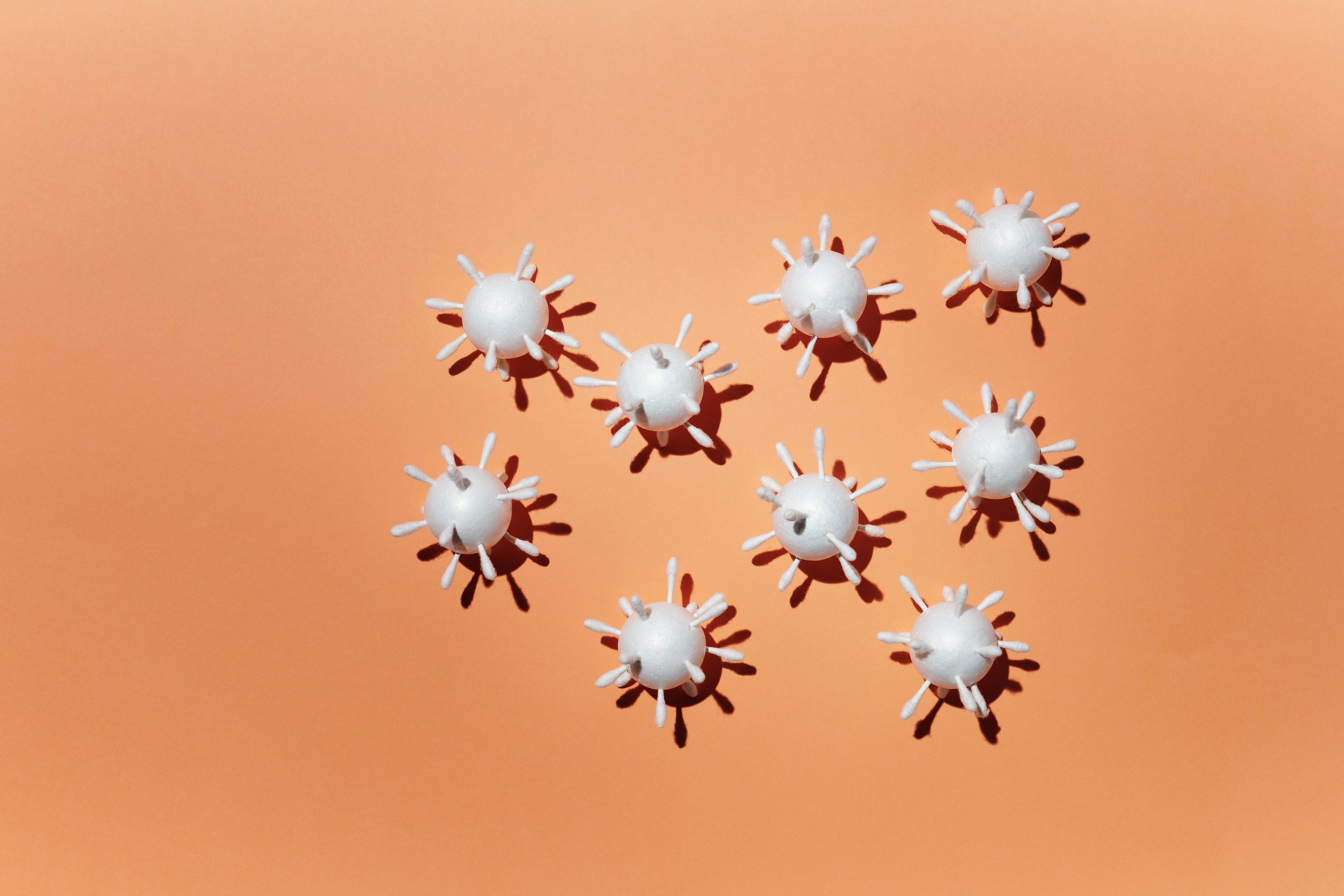5 Benefits of Collagen For Gut Health
5 Benefits of Collagen For Gut Health
It's all in the gut
Our gut includes all of the components of the gastrointestinal system. The mouth, pharynx, esophagus, stomach, small intestine, large intestine (sometimes known as the colon), rectum, and anus are all parts of our digestive system. When everything in our GI tract is in order and working correctly, and we have a healthy gut, our wellness improves dramatically.
We either set up all of our systems to thrive or struggle based on what we eat. A poor diet makes it harder for our digestive system to function at its best. When dangerous substances enter the body, the integrity of our gut lining is jeopardized.
When the intestinal wall is compromised, it leads to leaky gut syndrome (aka intestinal permeability). When the gut wall becomes porous, food particles enter the bloodstream instead of being digested properly. This causes an inflammatory response in our body that can lead to a host of issues; autoimmune diseases, irritable bowel syndrome, and celiac disease, just to name a few.
Therefore, digestive health has a significant impact on our entire body. Any digestive issues you have are inextricably linked to your body's immune response.
Many times, we think of cancers, IBD, and autoimmune disorders like they are some disease that we catch; 'I hope I don't catch cancer', like it is a common cold. These issues trace their roots to diet, lifestyle choices, unresolved trauma, stress, hormone, adrenal, and cortisol levels. All of these systems in our body are part of a cohesive system centered around the gut.
The good news is that when you improve your digestive health, you can enhance the rest of your body. Food is a healer. Lifestyle changes can improve your intestinal lining and heal your gut microbiome. That is one of the main reasons I am excited to talk about Collagen and Gelatin and how they can improve gut health.
Are you new to understanding how the gut works? I have a FREE 30-minute webinar on the gut that is a very helpful primer on how our digestive system works.
What is Collagen?
Collagen is the body's most plentiful protein. It is utilized to build connective tissue because of its fiber-like structure. This type of tissue joins other tissues and is a core part of bone, skin, muscles, tendons, and cartilage. Collagen benefits the development of robust and resilient tissues that can endure stretching.
Collagen accounts for over a third of all protein in the human body, and it is the most abundant form of protein in the body by mass.
Collagen is classified into 28 distinct classes based on the amino acid content of each type. Type 1 collagen, which is found in the skin, tendons, internal organs, and organic parts of bone, makes up about 90% of the collagen in the body.
Type 2 is found in cartilage, type 3 is in the lymphoid tissues and bone marrow, type 4 is found in the basement membrane (thin sheets surrounding tissues), and type 5 is in hair and on cell surfaces.
Collagen protein is made up of a triple helix, which is made up of two similar chains and the third chain with a slightly different chemical composition. Collagen's amino acid makeup is unusual for proteins, mainly because of its high hydroxyproline content.
Glycine-proline-X and glycine-X-hydroxyproline are the most common figures in the amino acid sequence of collagen, where X is any amino acid other than glycine, proline, or hydroxyproline. It is presented as the average amino acid content of fish and mammal skin.
Collagen plays a crucial role in blood vessels to maintain a solid and healthy structure.
As we age, collagen levels in our bodies go down. Excessive sun exposure, smoking, excessive alcohol, and a lack of sleep and exercise cause collagen production to drop more quickly.
Collagen in the deep skin layers degrades from a well-organized network of fibers to a disorganized maze as people age.
Collagen fibers can be damaged by the environment, lowering their thickness and strength, resulting in wrinkles on the skin's surface and other skin issues. Low collagen levels can also lead to oxidative stress (an imbalance of free radicals and antioxidants in the body).
For these reasons, many people take collagen or gelatin as a supplement to make up for a deficiency in the body.
Let's look at 5 benefits of collagen for the gut and overall health in the body.
How Does Collagen Help the Body?
1. Collagen Reduces Inflammation in the Gut
There is disagreement about whether collagen has an impact on leaky gut or gut inflammation. It's a complex discussion, but one study looked at how the tannic acid in gelatin (a derivative of collagen) causes anti-inflammatory effects by impeding the specific cytokines and adhesion molecules that occur in many inflammatory disorders.
Gelatin and collagen have the same basic nutritional structure. Collagen peptides don't have the gelling effect of gelatin and are soluble in water. They are highly digestible and bioavailable and are used in many dietary supplements.
According to the study, the gastrointestinal tract is the largest organ in the immune system and plays a significant role in nutrition absorption, processing, and exchange. The intestinal immune system is kept in balance under normal circumstances, with pro and anti-inflammatory cells and other chemicals carefully managed to promote a proper host mucosal defense capability without intestinal tissue loss.
Pathologic diseases such as inflammatory bowel disease, which is characterized by the invasion of inflammatory cells from the blood circulation, such as monocytes, lymphocytes, and neutrophils, could result from a disruption of this balance.
Intestinal inflammation and injury are caused by the mucosal immune system, with cytokines playing a pivotal role in inflammation modulation. Using particular cytokine inhibitors, cytokines may thus be a plausible therapeutic target for inflammatory bowel disease.
Tannic acid can be found in a variety of plants and foods. Tannic acid has been proven to reduce lipid oxidation and radical-mediated DNA breakage as an antioxidant by scavenging oxygen and oxygen-derived radicals. Tannic acid has been shown to have antibacterial activity against food-borne pathogens such as E. coli and Listeria monocytogenes in multiple studies.
Tannic acid has astringent qualities because it can create macromolecular complexes with the proteins it binds to via hydrogen bonds. Tannins have been demonstrated to be useful in treating diarrhea, with much better results than placebo, reducing the length of the illness while having no adverse side effects.
Collagen (and gelatin) can increase gut integrity and digestive strength by increasing gastric acid output and rebuilding a healthy stomach lining, thanks to the amino acids glycine, proline, and glutamine. They all absorb water and assist in maintaining fluid in the digestive tract, encouraging healthy bowel movements and intestinal transit.
One of the essential components of the GAPS diet, which is supposed to repair the gut and promote healthy digestion, is gelatin-rich soups and broths.
Collagen contains essential amino acids that are critical for the repair of the lining of our digestive tract, particularly glycine and glutamine, and thus plays a vital role in its rebuilding and strengthening.
Collagen peptides have been demonstrated in studies to help with gut barrier dysfunction and tight junctions.
In a 2020 animal study, researchers discovered an intriguing link between a collagen peptide-rich diet and a microbiome that produces more short-chain fatty acids (SCFAs). This is a fascinating new area of research because SCFAs have significant anti-inflammatory and immunomodulatory properties.
If you have gut issues going on, you should watch my FREE 30-minute Leaky gut Webinar. It gives lots of helpful tips on how to make lifestyle adjustments to mitigate any symptoms you are experiencing.
2. Collagen helps with joint pain
Your bones are a living, developing tissue made up primarily of collagen, the glue that ties our tissues together. Collagen is, therefore, extremely beneficial to bone and joint health.
Studies have shown Collagen supplementation to improve cartilage metabolism and prevent collagen breakdown in bones. It has the potential to help with both osteoporosis and osteoarthritis.
Its anti-inflammatory amino acids glycine and proline are likely to be the reason for research findings that gelatin is helpful in lowering arthritis-related joint discomfort.
Lysine, also found in gelatin, helps the body absorb calcium and make collagen, strengthening the bones. Because the body cannot produce this amino acid, it must be obtained through diet or supplementation.
In animal experiments, lysine has also been proven to speed up fracture repair.
Orally administered collagen hydrolysate has been demonstrated to be absorbed intestinally and accumulate in cartilage, according to one published study. Ingestion of collagen hydrolysate causes a statistically significant increase in chondrocyte production of extracellular matrix macromolecules.
These findings point to processes that could aid people with joint problems like OA.
Thinking about working with a Functional Diagnostic Practitioner? Click below to read a full case study of one of my Full Body Shift one-on-one clients.
3. Collagen helps grow hair and improve skin
With age comes wrinkled skin and hair loss. This is partly a result of an increased collagen deficiency in the body.
One study shows the effects of collagen on hair growth. Compared to the placebo, participants using a collagen-based lotion had a rise in hair mass of 20 to 30% and a concurrent increase in hair number (from 17 to 27%). An additional food supplement of collagen resulted in a 50 percent rise in hair growth and a considerable reduction in blood ROS (Reactive Oxygen Species).
In another study, almost 70% of the participants experienced increases in hair width ranging from 5% to 45% after using gelatin as a supplement. This rise is thought to be due to an improvement in the hair's mechanical characteristics. In addition, the increase in hair diameter was shown to be inversely proportional to the original, predosing value. Hair diameter returned to its previous level six months after gelatin dosing was stopped. Ingestion of gelatin was thus considered directly responsible for the rise.
Some question and disagree with the efficacy of using collagen for hair growth, so I suggest that you try it for six months to see if you notice any improvement. It has worked wonders for me. People often think I am 10 years younger that I am.
Less controversial are the positive results of collagen for the skin. Gelatin contains the amino acids glycine and proline, which assist your body produce enough collagen to improve the health and appearance of your skin and increase skin elasticity.
Skin aging is marked by dryness and an increased disintegration of the collagen network in the dermis. Nutrition has a significant impact on skin health and, as a result, appearance.
To boost skin health, a variety of nutritional supplements are available. Collagen peptides are employed as a bioactive ingredient in Nutri-cosmetic products. They have been proven to increase skin barrier function, induce collagen and hyaluronic acid synthesis, and promote fibroblast proliferation and migration in preclinical investigations.
One study showed that functional peptides could be transferred to the skin by taking dietary supplements of collagen.
Peptides are amino acids that constitute specific skin proteins. Because collagen consists of three polypeptide chains, peptides can help your skin produce more collagen. Collagen can help skin look firmer and younger.
Because the collagen molecule is too big to absorb via the skin, many people opt to consume collagen-rich bone broth or collagen supplements. Peptides, on the other hand, can absorb into the skin and be utilized by the body. There are numerous advantages to incorporating peptides into your skincare routine.
Have questions? I would love to hear your story and connect. You can book a FREE consult with me any time.
4. Collagen is the Perfect Protein Replacement
Collagen is a great alternative source of protein if you are struggling to digest foods that are typically high in protein.
If you have IBD or some other dysfunction in your GI tract, chances are higher that you have trouble digesting foods that are high in protein. This may keep you from eating foods like meat, eggs, and dairy. Collagen serves as an excellent replacement for the protein you miss out on from not eating these foods.
Vital Proteins contain 18g of protein in one serving size. That is the protein equivalent of 3 eggs, a double patty burger, or half a chicken breast. Having abundant protein in your diet is one of the building blocks of holistic health. Collagen contains three essential amino acids; glycine, proline, and hydroxyproline. Consuming collagen gives strength and structure to our body.
Here are my 3 favorite collagen powder products:
Collagen Peptides – 100% Daily Value Vitamin C – helps promote collagen production and a youthful appearance.
Marine Collagen – Made from the scales of fresh, wild-caught white fish off the coast of Alaska – very bioavailable and digestible.
Bovine Collagen – Mainly derived from cows – associated with many health benefits, including arthritis relief, improved skin health, and bone loss prevention.
5. Collagen Can Be Taken in Multiple Forms
The best thing about collagen is how many different ways you can take it; powder in a smoothie, in supplement form, or in foods. One of the easiest ways for me to take collagen on a daily basis is in my coffee or tea. It is a great way for me to start my day, and it tastes delicious in both of those drinks!
There are many different types of collagen, each playing a critical role in contributing to a healthy diet. While there are many benefits to specific collagen products, there are also a ton of collagen-rich foods you can eat.
One of my favorite sources of collagen is homemade bone broth. All of the animal parts used in bone broth contain collagen, which turns into gelatin when cooked and yields many different amino acids. It’s also a great source of healthy fats!
Other collagen-rich foods you can include to increase collagen intake include fish, egg whites, citrus fruits, berries, red and yellow vegetables, garlic, and white tea.
I hope this has been helpful for you! There are so many benefits of collagen, too many to name here.
If you are struggling with gut health, collagen is a simple way to make improvements and begin on your path to better gut health.
I also encourage you to reduce the amount of inflammatory foods you are putting in your diet; dairy, gluten, sugar, alcohol, and soy. These foods are hard on the lining of the gut and can lead to a compromised intestinal barrier.
Questions? Let’s connect! Book a call with me below.







